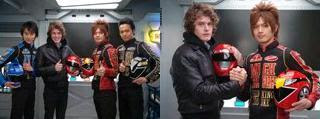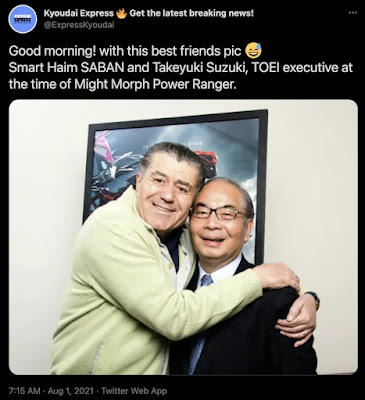Super Sentai, Power Rangers, And Language Barrier
With the 30th anniversary of Power Rangers approaching - I just write this one. It's going to be some strange rant of sorts. It's going to be strange because it's already established I don't like Power Rangers. However, I blame Toei more than I blame Saban for why it exists or why it overshadowed the source material for some time. Some people will still always insist on the whole "cultural erasure thing". Just because I don't like something doesn't mean it's a cultural erasure. I may not like Power Rangers but blaming it (instead of Toei and Bandai) as to why it took over the timeslot in the Philippines is PLAIN DUMB. It's as dumb as those who blame K-Dramas instead of the networks (such as Japanese companies trying to get more exclusive) as to why they got more famous than J-Drama. I remembered writing an article on JEFusion (while I decided to get experience and left so I could focus on my personal life) talking about the cultural differences between both franchises.
Possible challenges that people behind Power Rangers face when meeting the Japanese cast
Another reality faced is the language barrier. The interviews were done at Power Morphicon with the Japanese actors relying heavily on translators. That's one possible reason why it took some time before the West finally recognized Super Sentai in its entirety. It's one thing to know the Japanese source material, the history of why Power Rangers was even created, to begin with (due to cultural differences), and there's also the language barrier. Only a few people would ever bother watching a show without understanding the language.
The reality of the language barrier between Japan and America is no joke. SME Japan also cites this reality of English proficiency in Japan:
A 2019 survey found that Japanese speakers’ proficiency in English had dropped to the low 50s on a global scale. The Japanese economy has lagged behind its Asian and developed-country counterparts despite the Ministry of Education’s acknowledgment of the importance of English-language skills in the modern economy.
That's a real call for an alarm, right? I even wonder how Yoshi Sudarso navigated Toei's studios unless he learned a little Japanese. I wonder how Yoshi communicated with the cast of Shuriken Sentai Ninninger? Did Sudarso learn some Japanese or did he bring a translator with him? I think Yoshi was able to communicate with Donnie Yen in English. I doubt that any of the Ninninger cast knows the English language. Yoshi also made a short cameo, which I felt was a last-minute decision instead of something planned. I think Yoshi's photos with the cast mean a lot more than that one-shot cameo. I guess Yoshi couldn't speak enough Japanese to go beyond a one-shot. Hopefully, Yoshi will learn some Japanese to guest-star as a citizen in Toufu.

2008 would be what I'd call an interesting year. Now, I ended up HATING Engine Sentai Go-Onger after I watched Gekisou Sentai Carranger. It doesn't help that I also watched Tokumei Sentai Go-Busters - a series that almost feels like a sequel for Power Rangers RPM. The actor James MacLurcan did meet the cast of Go-Onger last 2008. I wonder how James communicated with the Japanese cast. I doubt any of the Go-Onger cast could speak English. I think James probably was given an interpreter to go along with him when he interacted with them. Otherwise, I doubt either side understood each other outside of an interpreter.
This also brings Haim Saban to mind. Some businessmen usually bring interpreters with them. I wonder how Saban signs contracts. I assume that Saban must be getting both a Japanese and an American-English contract to sign Maybe, a few employees in Toei Ltd. knew how to speak English. I could say there was also Bandai America back then. I assume Saban did pay for an interpreter since I doubt that he ever spoke Japanese. Before Toei, Saban did also work with Nintendo for the Super Mario Bros. Super Show. Did Saban really go to Nintendo HQ to secure the rights? I think Saban did. Probably, Saban went to Japan to play Super Mario Bros. The Lost Levels - a game that I hate to this day.
Saban did see Super Sentai in a hotel according to the documentary The Toys That Made Us. However, the producers at Toei Ltd. were still given translators to work with. I guess Saban also had translators left and right. Saban probably went to Japan to see the source of Super Mario. After the late Stan Lee's plan to adapt Taiyo Sentai Sun Vulcan failed - Saban would try again. Saban only saw success in 1993. At that time though, Saban already made some money working with Marvel property rights. Who can forget when X-Men: The Animated Series and Spider-Man: The Animated Series came out in the 1990s? I may dislike Power Rangers but I think Saban did a better job with handling Marvel adaptations. I watched Japanese Supaida-Man and find it too cheesy. I also don't like the way Disney is handling Marvel either.
The strange case of non-Japanese cast members in Super Sentai's mostly Japanese team
Super Sentai was meant to be a Japanese show so a multiracial team is unlikely. Power Rangers is an American show. America is a country where you have whites, blacks, and different types of Asian-Americans. We have some half-Japanese celebrities that were part of the main team. However, most non-Japanese celebrities tend to play sideline roles rather than the main cast. Hikari Sentai Maskman had Mimi Bruce act as Dr. Catherine but she was only a guest. The actress Dorothee played Dr. Dorothee as a guest character in Chojuu Sentai Liveman.
Later on, there was Samuel Pop Aning who was Pop in Denji Sentai Megaranger. Samuel would also play as Bucky Bonds in Bakuryu Sentai Abaranger. That was also the same episode that was gag-dubbed in Power Rangers Dino Thunder. If I'm not wrong Samuel himself can speak Japanese. Meanwhile, Shelly Sweeney guest-starred in a few Super Sentai in Ninja Sentai Kakuranger (as Gali's wife), as an INET personnel in Megaranger (episodes 1 and 8), as a news anchor in Kyukyu Sentai GoGoFive episode 49, and as an unnamed woman in Mahou Sentai Magiranger episode 37.
Ike Nwala apparently knows Japanese while speaking with a non-Japanese accent. Kaito Sentai Lupinranger vs. Keisatsu Sentai Patranger had the first African-American full-time character in Commissioner Samuel Hilltop. This was a rare occurrence as most non-Japanese celebrities may not know much of the Japanese language.

I guess Toei Ltd. wasn't too keen to repeat what they did in Kidou Keiji Jiban. The late Leo Meneghetti was voiced by the late Shozo Iizuka. Before that, there was also Diane Martin who was voiced by Lisa Komaki. Later, Lisa guest-starred in Battle Fever J sometime after Diane was written from the same show. B-Fighter Kabuto had Reuben Langdon who was voiced by Koichi Tochika. Reuben probably never spoke Japanese either.
This happens but it's a scarce thing. Japanese can take a lot of time to learn. I'd actually welcome Yoshi to have a full guest role though. I even had a weird dream Yoshi guest-starred as a citizen of Toufu and spoke all the lines himself. Otherwise, Yoshi could settle for being dubbed over which for me can be welcome but rather weird. I even wanted to have Jacqueline Scislowski play Himeno in Ohsama Sentai King-Ohger. Jacqueline could've been dubbed over as Himeno but she's got better opportunities than that now a few years after Power Rangers Beast Morphers.
How subtitles (and official subs) helped Power Rangers fans find their way
I guess any Power Rangers fan who checked out Super Sentai would confess to the use of fan subtitles. Many of these are fansubs because of the language barrier. Before Tokosou Sentai Dekaranger had its official subtitle release - I heard it was the first Super Sentai to get a fansub. I think that bridged the barrier. Most of the Super Sentai fansubs were actually from anything beyond Mirai Sentai Timeranger. I had a wild guess that most Power Rangers fans prefer anything after Timeranger because they're lighter and softer. Right now, I think it has to do that it's easier to appreciate something too foreign if you have some kind of aid like a dub (which I hate) and the subs (which for me, is better).
It can indeed take a lot of work. Japan's low English literacy rate can make it hard to make Nihonggo more accessible. Another possible barrier is that Mandarin Chinese has over a billion speakers. I believe Mandarin Chinese has become more accessible as Mandarin Chinese language shows are hitting faster than Japanese shows. It's not a surprise that Mandarin Chinese language shows might overtake Japanese shows. Super Sentai can also be affected. Japan needs to really make things "for Japan only" especially in this digital age.
We've got Toei Ltd. setting up licensed releases with Shout! Factory and Discotek. There might be more pre-Zyuranger Super Sentai series getting official releases soon Hopefully, Toei will realize their opportunity losses. Power Rangers already allowed it to hit the global market. Now, the global market knows it's based on some Japanese franchise known as Super Sentai. Super Sentai got underappreciated because of the whole "It's just for Japan." mindset. Sure, it won't make it into Fox Kids or any American network. However, official DVD subs have already succeeded since Zyuranger. It's really time to stop setting things up "Just for Japan" or "Just for Asia" because we're in the digital age.





Comments
Post a Comment